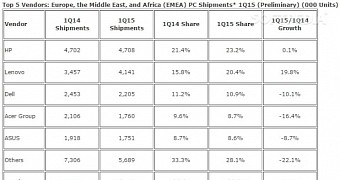Windows XP is no longer a supported operating system since April 2014, but it still keeps making the headlines because around 18 percent of the desktop PCs across the world are still running it.
And this unexpected love for Windows XP is also hurting PC makers, whose new computer sales remain low because users simply refuse to switch to a newer OS version.
A report published by IDC reveals that PC shipments in Europe, the Middle East, and Africa (EMEA) reached 20.2 million units in the first quarter of 2015, which represents a decline of 7.7 percent as compared to the same period of the previous year.
Specifically, Dell’s and Acer’s sales dropped the most during the period as the two companies had 10.1 percent and 16.4 percent fewer buyers in Q1 2015, respectively, as compared to Q1 2014.
According to the analysis firm, Windows XP’s 2014 EOS is one of the reasons behind this massive drop in PC shipments, because last year many organizations rushed to switch to a newer Windows version before Microsoft pulled the plug on XP. This year, without any critical reason to upgrade, organizations do not buy new PCs anymore so sales are obviously down compared to last year’s levels.
“The deceleration in the commercial market reflects the end of renewal waves of 2014, when growth was driven from one side by the end of Windows XP support in 1H2014 and from the other by a refresh cycle of old installed base in 2H2014,” IDC says.
Too many companies sticking to XP
But the truth is that there's also a second reason for this decline: Windows XP continues to power too many computers across the world and there are simply too many organizations running it these days.
While there are no accurate figures regarding how many companies are still using Windows XP, stats show that this 14-year-old OS version has a market share of approximately 17 percent, so there’s no doubt that many are still using it.
News on companies that stick to XP keep surfacing, and for example, Fukushima nuclear plant operator is willing to keep some 40,000 PCs on Windows XP until 2018, so it’s no wonder that new device sales are going from bad to worse.
That’s going to change with Windows 10, Microsoft and PC makers hope, as the new operating system would finally convince more companies and users to abandon Windows XP and buy a new PC. Windows 10 is projected to launch in the second half of 2015.

 14 DAY TRIAL //
14 DAY TRIAL //